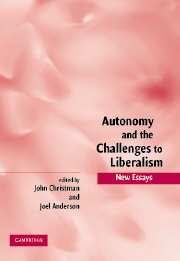Book contents
- Frontmatter
- Contents
- Contributors
- Preface
- Autonomy and the Challenges to Liberalism
- 1 Introduction
- PART I THE SELF: CONCEPTIONS OF THE AUTONOMOUS SELF
- PART II THE INTERPERSONAL: PERSONAL AUTHORITY AND INTERPERSONAL RECOGNITION
- PART III THE SOCIAL: PUBLIC POLICY AND LIBERAL PRINCIPLES
- PART IV THE POLITICAL: LIBERALISM, LEGITIMACY, AND PUBLIC REASON
- 11 Liberalism without Agreement: Political Autonomy and Agonistic Citizenship
- 12 The Place of Autonomy within Liberalism
- 13 Moral Autonomy and Personal Autonomy
- 14 Autonomy, Self-Knowledge, and Liberal Legitimacy
- Bibliography
- Index
13 - Moral Autonomy and Personal Autonomy
Published online by Cambridge University Press: 02 December 2009
- Frontmatter
- Contents
- Contributors
- Preface
- Autonomy and the Challenges to Liberalism
- 1 Introduction
- PART I THE SELF: CONCEPTIONS OF THE AUTONOMOUS SELF
- PART II THE INTERPERSONAL: PERSONAL AUTHORITY AND INTERPERSONAL RECOGNITION
- PART III THE SOCIAL: PUBLIC POLICY AND LIBERAL PRINCIPLES
- PART IV THE POLITICAL: LIBERALISM, LEGITIMACY, AND PUBLIC REASON
- 11 Liberalism without Agreement: Political Autonomy and Agonistic Citizenship
- 12 The Place of Autonomy within Liberalism
- 13 Moral Autonomy and Personal Autonomy
- 14 Autonomy, Self-Knowledge, and Liberal Legitimacy
- Bibliography
- Index
Summary
Modern philosophers distinguish between personal autonomy and moral autonomy. Talk of personal autonomy evokes the image of a person in charge of his life, not just following his desires but choosing which of his desires to follow. It is not an immoral idea, but it has relatively little to do with morality. Those who value it do not value it as part of the moral enterprise of reconciling one person's interest with another's; instead, they see it as a particular way of understanding what each person's interest consists in. Moral autonomy, by contrast, is associated specifically with the relation between one person's pursuit of his own ends and others' pursuit of theirs. This is particularly true of its Kantian manifestations. A person is autonomous in the moral sense when he is not guided just by his own conception of happiness, but by a universalized concern for the ends of all rational persons.
Modern proponents of personal autonomy are anxious to emphasize the distance between their conception and the moral conception. But I think it is worth considering some of the overlaps and affinities between them. We all know that autonomy in the moral sense is supposed to engage very specific capacities of rational deliberation and self-control. And these might seem out of place in a conception of autonomy oriented towards the pursuit of the good life at an individual level.
- Type
- Chapter
- Information
- Autonomy and the Challenges to LiberalismNew Essays, pp. 307 - 329Publisher: Cambridge University PressPrint publication year: 2005
- 16
- Cited by



